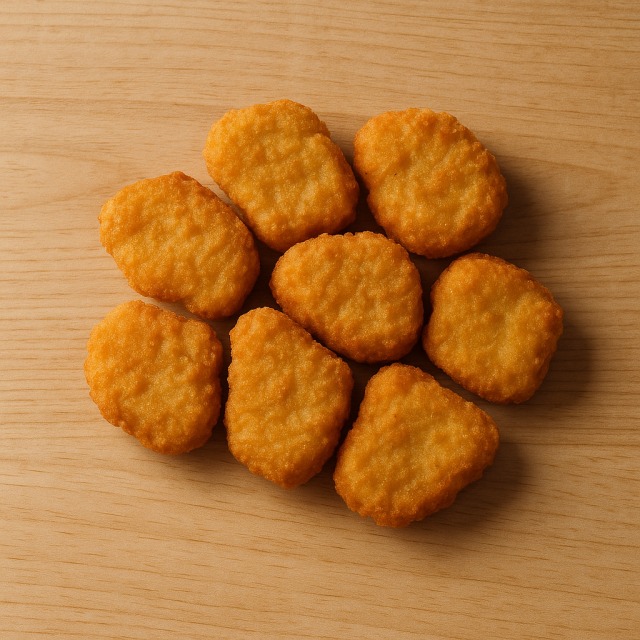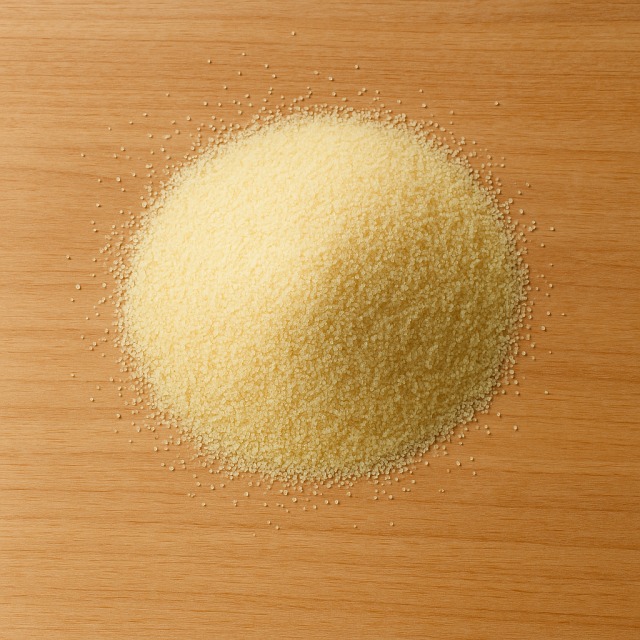Calorie Chart / Trimmings / Nuggets
How Many Calories Are in Nuggets?
Calculation of the nutritional value & Recommended Dietary Intake of nuggets
For g and a calorie requirement of kcal
| Calories 42 kcal | Proteins 2.9 g | Lipids 2.2 g | Carbohydrates 2.8 g |
| 2% | 4% | 3% | 1% |
Health benefits of nuggets

Nuggets - 100g
Calories 212 kcal
Proteins 14.4 g
Lipids 11.2 g
Carbohydrates 14 g
Nuggets are often criticised for their calories, yet with 212 kcal per 100 g, they actually belong to the moderate-calorie group: neither as light as a plain cucumber nor as rich as a portion of French fries. Those calories are distributed between 14.4 g of proteins, 11.2 g of lipids, and 14 g of carbohydrates, giving nuggets a fairly balanced macronutrient profile for anyone counting calories in a pragmatic way.
Because the core ingredient is chicken meat, nuggets supply complete proteins that contribute to muscle maintenance. They also bring B-group vitamins, especially niacin (B3) and vitamin B6, which assist energy metabolism – an indirect but real benefit when you watch your daily calories. Among minerals, selenium and phosphorus stand out; the first participates in antioxidant defenses, and the second supports bone health. Homemade or premium versions, prepared with sunflower or rapeseed oil instead of palm oil, limit saturated fat without changing the calories too much.
On the "supposed" benefit side, the crunchy breadcrumb coating may increase satiety by slowing gastric emptying, helping some people reduce subsequent calorie intake; scientific evidence is limited, so this advantage remains theoretical. Historically, the modern chicken nugget was developed in the early 1960s by Professor Robert C. Baker at Cornell University to create a convenient, protein-rich food that could be frozen and reheated with minimal extra calories from added fat.
In short, nuggets provide moderate calories, useful proteins, and several micronutrients, as long as sodium and frying oil are kept under control.
Tips for incorporating nuggets into a balanced diet
If you like nuggets but monitor calories, bake or air-fry them instead of deep-frying: you can save up to 30% of the calories coming from added oil. Serve them with roasted broccoli and a scoop of brown rice to create a plate that delivers fiber and slows the absorption of calories from the breadcrumb coating.
For a balanced lunch box, cut warm nuggets into strips and wrap them in a soft tortilla with crisp lettuce, diced tomato, and a spoonful of homemade yogurt sauce; this adds freshness without exploding your calorie budget the way classic mayonnaise would.
Craving comfort food? Replace the usual fries in a kids' menu with mashed pumpkin or oven-baked potato wedges brushed with light oil. You will still enjoy the same familiar taste profile while trimming several dozen calories per serving.
Finally, remember portion control: three or four medium nuggets (about 60–80 g) contribute roughly 130–170 calories, leaving room for a side salad or a cup of fruit salad. Tracking those calories helps you fit this popular finger food into almost any eating plan.
Frequently Asked Questions
- How many calories are in nuggets?
- There are 212 kcal per 100 g.
- Are nuggets high in protein compared with their calories?
- Yes. With 14.4 g of protein for 212 calories, nuggets offer about 6.8 g of protein per 100 calories, comparable to a plain chicken breast once you adjust for the breadcrumb coating.
- What cooking method keeps calories lowest?
- Baking or air-frying avoids the extra oil absorbed during deep-frying, cutting roughly 30–40 calories per standard 4-piece portion.
- Can nuggets fit into a weight-loss diet?
- Yes, if you track calories and balance the meal with vegetables such as spinach or zucchini. Portion control and a lean cooking method are key.
- Are homemade nuggets lower in calories than fast-food versions?
- Generally yes, because you can choose lean meat, whole-grain crumbs, and limit added fat, shaving 20–50 calories off every 100 g.
Similar foods
Information provided by Calorie Menu may contain inaccuracies or errors. It cannot, under any circumstances, substitute medical advice or medication.










